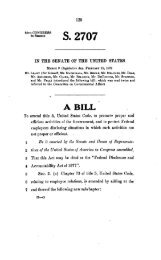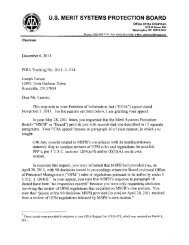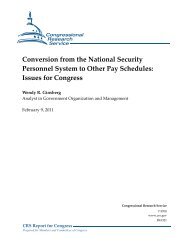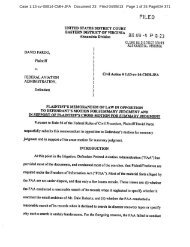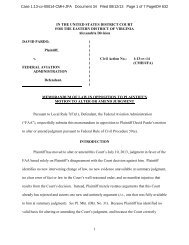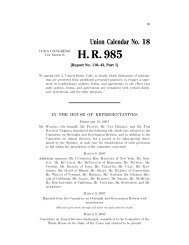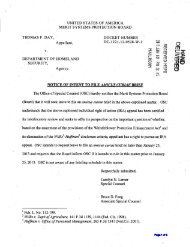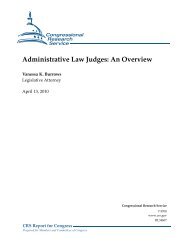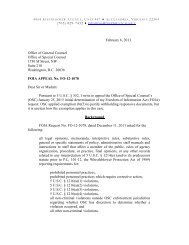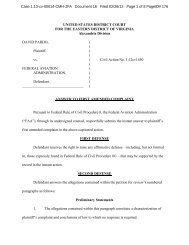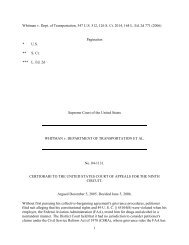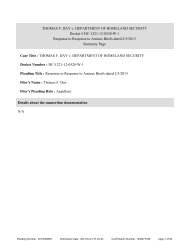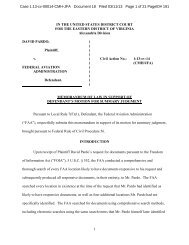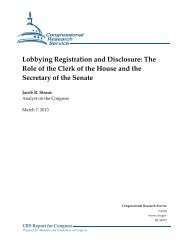The Fair Labor Standards Act (FLSA): An Overview - MSPB Watch
The Fair Labor Standards Act (FLSA): An Overview - MSPB Watch
The Fair Labor Standards Act (FLSA): An Overview - MSPB Watch
Create successful ePaper yourself
Turn your PDF publications into a flip-book with our unique Google optimized e-Paper software.
<strong>The</strong> <strong>Fair</strong> <strong>Labor</strong> <strong>Standards</strong> <strong>Act</strong> (<strong>FLSA</strong>): <strong>An</strong> <strong>Overview</strong>passed, and the President signed, the Insular Areas <strong>Act</strong> of 2011 (P.L. 112-149). <strong>The</strong> act delayedthe increases in the minimum wages in American Samoa for 2012, 2013, and 2014. <strong>The</strong> nextminimum wage increases in American Samoa are scheduled for September 30, 2015. <strong>The</strong>reafter,increases will be made every three years until they reach the federal minimum wage.In the mid-1970s, the United States and CNMI entered into a Covenant of Association. CNMIretained control over the minimum wage in the islands. However, as was the case with AmericanSamoa, P.L. 110-28 mandated that the minimum wage in CNMI be raised by $0.50 a year until itreached the same level as in the continental United States. However, P.L. 111-244 postponed thescheduled increase in the minimum wage for 2011. On September 30, 2012, the minimum wagein CNMI increased by $0.50 an hour to $5.55.OvertimeUnder Section 7, employers must pay covered workers at least one-and-a-half times their regularhourly wage for hours worked over 40 hours a week at a given job. Employers may choose to paymore than time-and-a-half for overtime or to pay overtime to employees who are exempt fromovertime under the <strong>FLSA</strong>.Under the <strong>FLSA</strong>, overtime pay applies to hours worked in excess of 40 in a workweek. Thus, thelaw allows some flexibility in work hours. For example, an employer could schedule four 10-hourworkdays in a workweek without asking employees to work overtime. Similarly, an employeewho works a five-day workweek could work four hours one day and nine hours the other fourdays and not work overtime. 30Comp Time in Lieu of Overtime Pay<strong>The</strong> <strong>FLSA</strong>, under Section 7(o), allows covered, nonexempt state and local government employeesto receive compensatory time off (“comp time”) for hours worked over 40 in a workweek. Comptime is time off with pay in lieu of overtime pay. <strong>An</strong> employer and employees must agree that theemployer will provide comp time. <strong>The</strong> agreement may be through a collective bargainingagreement or, if there is no such agreement, between the employer and individual employees.Comp time is calculated at a rate that is at least one-and-a-half times the number of overtimehours worked. In general, state and local government employees may accrue up to 240 hours ofcomp time. Law enforcement, fire protection, emergency response personnel, and employeesengaged in seasonal activities may accrue up to 480 hours of comp time. Instead of providingcomp time, an employer may pay an employee for any unused comp time. <strong>An</strong> employee must beallowed to use comp time on the date requested, unless doing so would “unduly disrupt” the(...continued)Territory of Guam, and for Other Purposes (P.L. 111-244).30 Some states have overtime laws that are more protective of employees than the <strong>FLSA</strong>; for example, overtime paymay be required if an employee works more than 8 or 12 hours in a day. See U.S. Department of <strong>Labor</strong>, Wage andHour Division, Wage and Hour Division (WHD) Minimum Wage Laws in the States, January 1, 2012,http://www.dol.gov/whd/minwage/america.htm.Congressional Research Service 8



